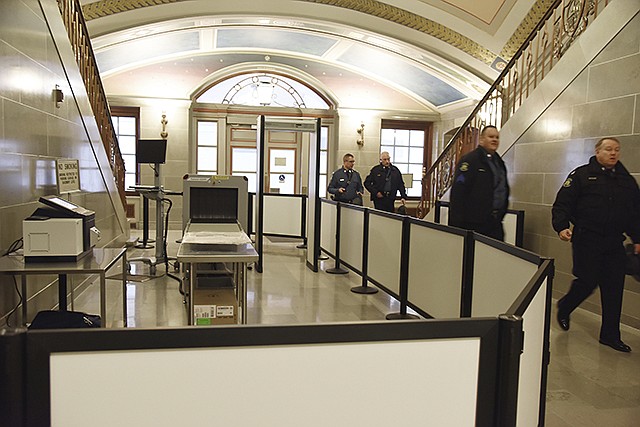Beginning Tuesday - the first full day of the Eric Greitens administration - visitors to Missouri's Capitol will be screened by security officers.
Although other security measures have remained and visitors to the state Supreme Court are screened with a metal detector and X-ray machine, Missouri government hasn't screened visitors at other buildings in Jefferson City since July 1, 2003 - after legislators eliminated funding for the private security guards who had been staffing the metal detectors at the Capitol and Truman State Office Building after the Sept. 11, 2001, terrorist attacks.
"Keeping not only the elected officials safe in the Capitol, but our visitors safe, is very important to the people here," state Sen. Mike Kehoe, R-Jefferson City, told the News Tribune on Wednesday.
"People will take awhile to get used to it - but we have a great staff here who will be telling people what's the easiest way to get in and get out."
State Rep. Jay Barnes, R-Jefferson City, added: "I agree with the general principle of making the building more secure.
"The operational details, I think, are something that obviously are going to be subject to continual review."
Details of the new search procedures are contained in a "Missouri Capitol Police Advisor" notice distributed to Capitol employees Wednesday.
It noted "X-ray conveyors and walk-through magnetometers will be operated by law enforcement officers and security personnel to ensure firearms and other dangerous items do not enter the building."
While visitors currently can enter the Capitol through any of seven entrances, their future access will be limited to two main doors being designated as "a searched entrance":
First floor West entrance.
First floor South Carriage Tunnel, which also is designated as the primary disabled entrance.
"Members of the disabled public are subject to search when choosing to enter the Capitol," the Capitol Police notice said.
The basement garage entrance on the east side of the building is designated as a "secondary" searched entrance.
The notice said visitors subject to being searched include contract employees, special guests, members of the media and lobbyists, many of whom who are in the building on a regular basis.
"We're very sensitive to that fine line of trying not to restrict access to the people here - especially to the school groups, the thousands of those kids, who come through, as well as our constituents," Kehoe said.
The Capitol Police notice also emphasized: "Delivery drivers who are not state employees will no longer be able to drive into the Capitol Basement.
"They must unload outside of the Capitol Basement Garage and are subject to search by security, by means of a hand-wand, as well as permitting their deliveries to be physically searched."
Deliveries also will be allowed to enter the South First Floor Carriage door, but still be subject to search.
The new rules allow for some exceptions:
State employees assigned to the Capitol and those with regular business in the Capitol will be vetted by state department directors and issued appropriate electronic key card credentials for unsearched entry into the First Floor East door, by the model of the Battleship Missouri; the West Basement door by the cafeteria; and the Southwest First Floor Carriage door.
School groups, but only children who are not yet in high school and not carrying backpacks, satchels, etc.
While the children would be allowed to bypass the searches, their teachers and chaperones still would be subject to a search.
Weapons: Some people will be allowed to have weapons in the building, including state, federal and local law enforcement officers, peace officers, probation and parole officers, wardens and superintendents of prisons or penitentiaries, members of the Armed Forces and National Guard, and persons vested with judicial authority by the state or federal courts.
The new rules say those people must use the searched entries, but their credentials would be verified by a law enforcement officer and they could then enter the Capitol with their weapons.
However, the Capitol police noted, a concealed carry permit does not allow for a firearm to be brought into the Capitol - and people "wishing to enter the Capitol Building and legally in possession of a firearm will be asked to return the firearm to a secure location in their vehicle" before entering.
Some items will be prohibited, including, unless authorized, firearms and weapons of any kind, including any knife with a blade exceeding 4 inches; explosives; signs affixed to poles or standards; and balloons.
Capitol Police advise visitors: "Anything illegal to possess under Missouri law may be seized and retained as evidence in a criminal prosecution."
Barnes noted Missouri's Capitol long has been one of the nation's "least-protected that's going to change."

